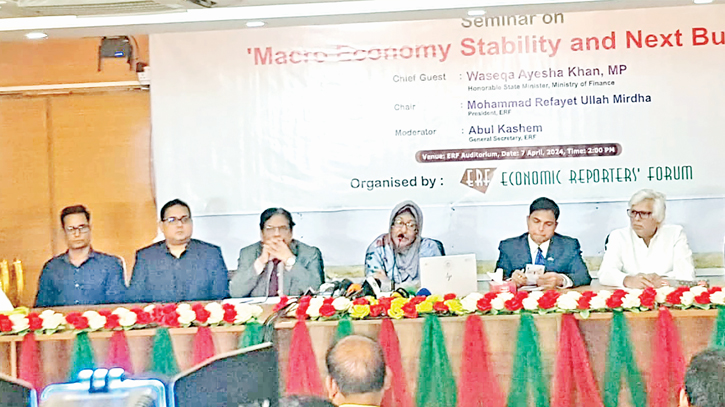
Photo : Collected
Income inequality and discrimination in the country rose in such a way that it seems there is a dual economy and with that, building an inclusive economy is not possible, said a noted economist on Sunday (7 April).
The dual economy was in place during the Pakistani period and freedom fighters sacrificed their lives for a country and an inclusive economy, said Mustafizur Rahman, a distinguished fellow of the Centre for Policy Dialogue (CPD).
That old dual economy is seen again in the country, he said, adding the number of unemployed people is rising. “For instance, 25 per cent of the fresh graduates of National University are unemployed.”
Mustafizur was addressing a discussion titled “Macroeconomic stability and next budget” organised by the Economic Reporters’ Forum (ERF) at its office in the capital. State Minister for Finance Waseqa Ayesha Khan attended it along with businessmen, economists, and journalists.
The CPD distinguished fellow suggested the government increase direct taxes so that the wealthy pay more tax and the lower-income people need not be overburdened by tax.
He also said the highest rate of income tax was lowered to 25 per cent during the Covid-19 pandemic as it was a tough time. “But the rate was not increased again to the previous level of 30 per cent although the pandemic is over now.”
It is expected that the government will increase direct taxes again in the upcoming national budget for the fiscal year 2024-25, the economist added.
Anwar Ul Alam Chowdhury Parvez, president of Bangladesh Chamber of Industries (BCI), said the cost of doing business increased many times for different reasons.
“For instance, gas prices have been increased by nearly 178 per cent, but the supply of energy to the industrial units is not adequate yet,” he said.
The owners of many micro, small, and medium enterprises that used to create jobs have now turned into job-seekers as they cannot run their businesses because of higher costs, said Parvez.
He also mentioned the harassment of businessmen by the customs and other wings of the National Board of Revenue. He called for publishing the genuine export data as the figures given by the Export Promotion Bureau (EPB) and the customs vary. “The EPB says export income is $32 billion while the customs department puts the amount at $26 billion.”
Shams Mahmud, managing director of Shasha Denims, said there are 750 small and medium-sized garment factories that may face big challenges because of the rising cost of doing business. He suggested the government negotiate with India so that local exporters can enjoy duty-free benefits while shipping goods.
Former senior finance secretary Mahbub Ahmed suggested the government raise allocations in sectors like health, education, agriculture, and skills development.
State Minister for Finance Ayesha said the private sector is very important and the government always consults with the stakeholders before making decisions.
She said the government is taking opinions from private sector stakeholders to prepare the next budget. “The government has been paying incentives to various sectors for many years and some of those are now capable enough to be more competitive. They may not need incentives anymore.”
ERF President Mohammad Refayet Ullah Mirdha chaired the discussion while General Secretary Abul Kashem moderated it.
Messenger/Mumu








